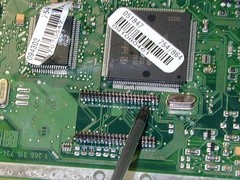The Volkswagen 1.8 turbo engine, a powerhouse found in models like the Golf, Jetta, and Audi TT, is renowned for its responsiveness to performance modifications. According to Kris Valdez, the VW tuning expert at Dynamic Racing Solutions, these engines react exceptionally well to ECU enhancements and other upgrades. Let’s dive into the stages of tuning this remarkable engine, ensuring you get the most out of your VW 1.8T.
Stage 1: Entry-Level Performance Boosts
For those just starting their tuning journey, Stage 1 modifications offer significant gains without requiring extensive mechanical changes. As Kris Valdez of Dynamic Racing Solutions explains, “The 150-horsepower version can typically jump to around 190 horsepower at the crank simply with an ECU chip upgrade and a larger exhaust system.” Engines already producing 180 horsepower will see a smaller but still worthwhile increase to a similar output level.
However, Valdez points out a couple of exceptions. The New Beetle 1.8T engine, due to its smaller turbo, intercooler, and injectors, is limited in its safe tuning potential beyond stock figures. Similarly, the high-performance 225-horsepower Audi TT engine is already highly optimized from the factory, making substantial improvements challenging.
When it comes to ECU chips, Valdez notes that the market offers many reliable options. “Most chip manufacturers provide various tuning stages, and we’ve generally found them to be effective as long as they are appropriately matched to the engine modifications,” he states.
Exhaust systems are crucial for turbocharged engines. Valdez emphasizes, “With turbo cars, especially when chasing high boost levels, a larger exhaust is always beneficial. We’ve observed gains of up to 20 horsepower simply by upgrading to a three-inch exhaust system on high-boost applications. Investing in a larger exhaust is often the most impactful modification for those seeking serious power.” The main trade-off with larger exhausts is increased noise levels.
Interestingly, Valdez highlights the efficiency of the stock VW airbox. “The factory airbox is surprisingly good and doesn’t usually become a bottleneck until you reach higher power levels. Some aftermarket turbo kit manufacturers even advise reinstalling the stock airbox if it has been previously removed. Paired with a quality filter, the stock airbox is generally sufficient,” he clarifies.
While the stock intercooler is adequate for stock power, it can become a limiting factor when pushing for more performance. Valdez explains, “A stock intercooler can deliver impressive dyno numbers initially, but its performance tends to become inconsistent due to heat soak. For sustained performance in real-world driving conditions, a larger front-mount intercooler is highly recommended.”
Stage 2: Stepping Up the Performance Ladder
Moving beyond Stage 1, Stage 2 tuning involves more significant component upgrades to unlock further power from your 1.8T engine. This stage typically includes a larger turbocharger and higher-capacity fuel injectors.
Valdez from Dynamic Racing Solutions advises, “The stock K03 turbocharger is generally capable of supporting around 250 horsepower at the crank, or approximately 190 horsepower at the wheels. The turbo from the Audi TT offers a bit more headroom, but for the investment, there are more effective aftermarket turbo upgrades available. GT35/GT40 turbo kits are particularly cost-effective and can push you to the limits of the stock engine internals, around 300 horsepower.”
Fuel delivery becomes a critical factor at this stage. “The stock fuel injectors tend to become restrictive beyond 210 horsepower,” Valdez notes. Upgrading to larger injectors, along with a compatible ECU chip tune, allows the engine to reach the 300 horsepower mark. Beyond this point, the factory ECU becomes the primary constraint.
“Without custom ECU programming, we haven’t seen reliable power figures exceeding 250 horsepower at the wheels using the stock ECU,” Valdez clarifies. Custom tuning of the stock ECU is an option, but it can be costly. “For high-horsepower builds, we often recommend switching to a standalone aftermarket ECU. It’s often more economical and provides greater flexibility compared to a reprogrammed factory ECU. Any performance build beyond a basic turbo upgrade kit will necessitate custom tuning to maximize engine potential.”
Stage 3: Forging the Bottom End for Extreme Power
For enthusiasts craving even more power beyond 300 horsepower from their 1.8T, Stage 3 modifications focus on strengthening the engine’s bottom end and increasing displacement. Dynamic Racing Solutions offers two primary approaches to achieve this.
The first, more straightforward method involves utilizing custom forged pistons and connecting rods while retaining the stock crankshaft. “Our 1.9-liter upgrade kit features JE Pistons with a readily available 9.0:1 compression ratio, optimized for high boost pressures—up to 30 psi,” Valdez details. “To fully realize the potential of this setup, a larger turbocharger and a tubular exhaust manifold are essential.” At this advanced tuning level, performance camshafts and cylinder head work, particularly on the intake side, become increasingly beneficial.
For those aiming for truly extreme power figures, exceeding 400 horsepower, DRS offers a 2.0-liter stroker build. This involves swapping in a custom-machined 2.0-liter crankshaft into the 1.8T engine block, creating a 2.0T monster motor. “This configuration has proven capable of producing 500 horsepower at the crank on our dyno, and it’s robust enough to propel a heavy Audi A4 down the quarter-mile in the 12-second range,” Valdez states. While not for the average driver, the 2.0-liter conversion demonstrates the remarkable untapped potential within the seemingly small 1.8T engine.
Drivetrain Considerations for High-Power 1.8T Builds
With significant power increases from 1.8T engine tuning, the drivetrain becomes a crucial area to address to ensure reliability and performance.
According to Kris Valdez, “The factory clutch is typically the weakest link in the drivetrain. Upgrading the clutch is almost mandatory after a turbo upgrade.” With a stronger clutch, the factory transmission generally holds up well, although transmission longevity is more influenced by driving habits than sheer engine power.
“These transmissions are considerably more robust than the older VW five-speed transmissions that were prone to failure. While Audi gearboxes are known to be stronger, the standard VW transmissions are generally quite durable,” Valdez concludes.
While the VW 1.8T engine has not been around for decades like some other engines, extensive knowledge and numerous performance enhancements have already been developed. As with many turbocharged engines, achieving substantial power gains from a 1.8T often boils down to effectively increasing and managing boost pressure. With careful planning and the right modifications, the Vw 1.8 Turbo Engine can be transformed into a true performance machine.


